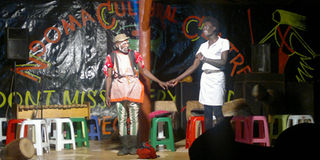Prime
Traditional dance troupes take over Sunday evenings

Ngoma Troupe’s performances are punctuated with comedy. Photo by Brian Magoba
On any given Sunday, if you stood in the old taxi park, spun around blindfold and followed the direction you ended when you stopped, chances are somewhere along the road you would find a cultural arts group performing a family show at a bar, hotel or restaurant.
You would find 2008 PAM Award Winners Ndere Troupe at the Uganda Development Theatre Association Centre in the Ntinda-Kisaasi area, Carnival Dance Rhythm at The Carnival also in Ntinda, Crane Performers at the Serena Hotel, Sosolye Undugu Dance Academy at the Muyenga International Hotel, Kitara Troupe at Texas Bar in Nsambya, and in Wankulukuku, Ngoma Troupe at the Ngoma Cultural Centre.
Even discounting for troupes like Mizizi Arts Ensemble, Uganda Heritage Roots, Undugu Family’s Cultural Beat, and 2011 PAM Award nominees Kika Troupe, whose regularity for Sunday shows oscillates between defunct and semi-resurrection, traditional music and dance enthusiasts are spoilt for choice if they do not want to spend half the year’s Sundays hopping from one performance space to another.
Intrigued by their advert on Bukedde TV, last Sunday I headed for Wankulukuku to see Mathias Senkubuge’s Ngoma Troupe. Only in their fifth month as resident artistes, the troupe which began life as Masters of the Drum (MD Rakai) has an exciting, refreshingly original repertoire of tunes and choreographies that make for wholesome family entertainment.
For starters, with the exception of Kitara whose style is a Kinyankole-speaking bandmaster working with a translator, they are the only other group whose directors use a native language—Luganda in their case, as they emcee the show. Needless to say, this reflects the patronage they receive.
So Ganda-fied are they that the show’s coordinator at some point made the team’s girls kneel to thank the audience for coming, and so special is the Bakisimba dance to them that they have two versions of it, each done by differently-costumed squads of five girls and one male dancer.
And when you go, the Kiganda dances and music are the ones not to miss. Even limited in expression and exaggeration by the small size of the stage and poor lighting, so captivating are they that the audience did the rare combination of gifting money many times over and dancing along. When not constrained by space issues, the 25-strong team in full flow must be spectacular!
What proficiency they lacked in other dances, they more than made up for with their comic karaoke act during intervals, treating revellers to over-the-top farcical renactments of popular songs like Pheobe Nassolo’s Kwata Wano.
They lead with a more-music, less-talking style compared to Ndere-style and Crane-style edutainment formats. So, if you already heard Ndere’s version of the creation story as relates to Acholi people when they are doing their pot dance with that Timjamin song which featured on the soundtrack of The Last King of Scotland and could do with just the music and dance, these are the folks for you.




